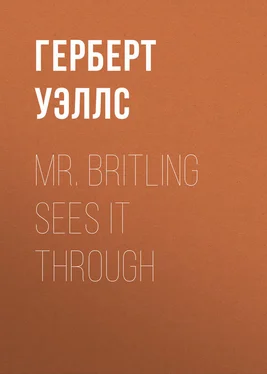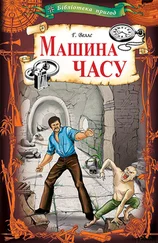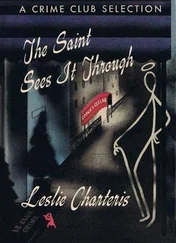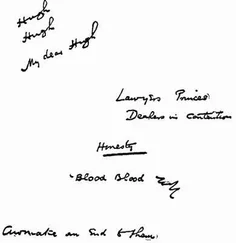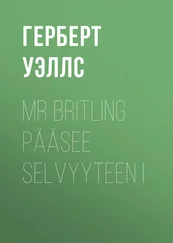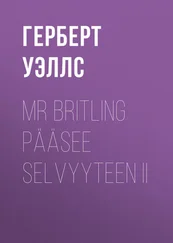Герберт Уэллс - Mr. Britling Sees It Through
Здесь есть возможность читать онлайн «Герберт Уэллс - Mr. Britling Sees It Through» — ознакомительный отрывок электронной книги совершенно бесплатно, а после прочтения отрывка купить полную версию. В некоторых случаях можно слушать аудио, скачать через торрент в формате fb2 и присутствует краткое содержание. Жанр: История, foreign_prose, на английском языке. Описание произведения, (предисловие) а так же отзывы посетителей доступны на портале библиотеки ЛибКат.
- Название:Mr. Britling Sees It Through
- Автор:
- Жанр:
- Год:неизвестен
- ISBN:нет данных
- Рейтинг книги:3 / 5. Голосов: 1
-
Избранное:Добавить в избранное
- Отзывы:
-
Ваша оценка:
- 60
- 1
- 2
- 3
- 4
- 5
Mr. Britling Sees It Through: краткое содержание, описание и аннотация
Предлагаем к чтению аннотацию, описание, краткое содержание или предисловие (зависит от того, что написал сам автор книги «Mr. Britling Sees It Through»). Если вы не нашли необходимую информацию о книге — напишите в комментариях, мы постараемся отыскать её.
Mr. Britling Sees It Through — читать онлайн ознакомительный отрывок
Ниже представлен текст книги, разбитый по страницам. Система сохранения места последней прочитанной страницы, позволяет с удобством читать онлайн бесплатно книгу «Mr. Britling Sees It Through», без необходимости каждый раз заново искать на чём Вы остановились. Поставьте закладку, и сможете в любой момент перейти на страницу, на которой закончили чтение.
Интервал:
Закладка:
"In Germany everything is definite. Every man knows his place, has his papers, is instructed what to do…"
"Yet," said Mr. Direck, with his eyes on the glowing roses, the neat arbour, the long line of the red wall of the vegetable garden and a distant gleam of cornfield, "it all looks orderly enough."
"It is as if it had been put in order ages ago," said Herr Heinrich.
"And was just going on by habit," said Mr. Direck, taking up the idea.
Their comparisons were interrupted by the appearance of "Teddy," the secretary, and the Indian young gentleman, damp and genial, as they explained, "from the boats." It seemed that "down below" somewhere was a pond with a punt and an island and a toy dinghy. And while they discussed swimming and boating, Mr. Carmine appeared from the direction of the park conversing gravely with the elder son. They had been for a walk and a talk together. There were proposals for a Badminton foursome. Mr. Direck emerged from the general interchange with Mr. Lawrence Carmine, and then strolled through the rose garden to see the sunset from the end. Mr. Direck took the opportunity to verify his impression that the elder son was the present Mrs. Britling's stepson, and he also contrived by a sudden admiration for a distant row of evening primroses to deflect their path past the arbour in which the evening light must now be getting a little too soft for Miss Corner's book.
Miss Corner was drawn into the sunset party. She talked to Mr. Carmine and displayed, Mr. Direck thought, great originality of mind. She said "The City of the Sun" was like the cities the boys sometimes made on the playroom floor. She said it was the dearest little city, and gave some amusing particulars. She described the painted walls that made the tour of the Civitas Solis a liberal education. She asked Mr. Carmine, who was an authority on Oriental literature, why there were no Indian nor Chinese Utopias.
Now it had never occurred to Mr. Direck to ask why there were no Indian nor Chinese Utopias, and even Mr. Carmine seemed surprised to discover this deficiency.
"The primitive patriarchal village is Utopia to India and China," said Mr. Carmine, when they had a little digested the inquiry. "Or at any rate it is their social ideal. They want no Utopias."
"Utopias came with cities," he said, considering the question. "And the first cities, as distinguished from courts and autocratic capitals, came with ships. India and China belong to an earlier age. Ships, trade, disorder, strange relationships, unofficial literature, criticism – and then this idea of some novel remaking of society…"
§ 8
Then Mr. Direck fell into the hands of Hugh, the eldest son, and anticipating the inevitable, said that he liked to walk in the rose garden. So they walked in the rose garden.
"Do you read Utopias?" said Mr. Direck, cutting any preface, in the English manner.
"Oh, rather !" said Hugh, and became at once friendly and confidential.
"We all do," he explained. "In England everybody talks of change and nothing ever changes."
"I found Miss Corner reading – what was it? the Sun People? – some old classical Italian work."
"Campanella," said Hugh, without betraying the slightest interest in Miss Corner. "Nothing changes in England, because the people who want to change things change their minds before they change anything else. I've been in London talking for the last half-year. Studying art they call it. Before that I was a science student, and I want to be one again. Don't you think, Sir, there's something about science – it's steadier than anything else in the world?"
Mr. Direck thought that the moral truths of human nature were steadier than science, and they had one of those little discussions of real life that begin about a difference inadequately apprehended, and do not so much end as are abandoned. Hugh struck him as being more speculative and detached than any American college youth of his age that he knew – but that might not be a national difference but only the Britling strain. He seemed to have read more and more independently, and to be doing less. And he was rather more restrained and self-possessed.
Before Mr. Direck could begin a proper inquiry into the young man's work and outlook, he had got the conversation upon America. He wanted tremendously to see America. "The dad says in one of his books that over here we are being and that over there you are beginning. It must be tremendously stimulating to think that your country is still being made…"
Mr. Direck thought that an interesting point of view. "Unless something tumbles down here, we never think of altering it," the young man remarked. "And even then we just shore it up."
His remarks had the effect of floating off from some busy mill of thought within him. Hitherto Mr. Direck had been inclined to think this silent observant youth, with his hands in his pockets and his shoulders a little humped, as probably shy and adolescently ineffective. But the head was manifestly quite busy…
"Miss Corner," he began, taking the first thing that came into his head, and then he remembered that he had already made the remark he was going to make not five minutes ago.
"What form of art," he asked, "are you contemplating in your studies at the present time in London?"…
Before this question could be dealt with at all adequately, the two small boys became active in the garden beating in everybody to "dress-up" before supper. The secretary, Teddy, came in a fatherly way to look after Mr. Direck and see to his draperies.
§ 9
Mr. Direck gave his very best attention to this business of draping himself, for he had not the slightest intention of appearing ridiculous in the eyes of Miss Corner. Teddy came with an armful of stuff that he thought "might do."
"What'll I come as?" asked Mr. Direck.
"We don't wear costumes," said Teddy. "We just put on all the brightest things we fancy. If it's any costume at all, it's Futurist."
"And surely why shouldn't one?" asked Mr. Direck, greatly struck by this idea. "Why should we always be tied by the fashions and periods of the past?"
He rejected a rather Mephistopheles-like costume of crimson and a scheme for a brigand-like ensemble based upon what was evidently an old bolero of Mrs. Britling's, and after some reflection he accepted some black silk tights. His legs were not legs to be ashamed of. Over this he tried various brilliant wrappings from the Dower House armoire , and chose at last, after some hesitation in the direction of a piece of gold and purple brocade, a big square of green silk curtain stuff adorned with golden pheasants and other large and dignified ornaments; this he wore toga fashion over his light silken under-vest – Teddy had insisted on the abandonment of his shirt "if you want to dance at all" – and fastened with a large green glass-jewelled brooch. From this his head and neck projected, he felt, with a tolerable dignity. Teddy suggested a fillet of green ribbon, and this Mr. Direck tried, but after prolonged reflection before the glass rejected. He was still weighing the effect of this fillet upon the mind of Miss Corner when Teddy left him to make his own modest preparations. Teddy's departure gave him a chance for profile studies by means of an arrangement of the long mirror and the table looking-glass that he had been too shy to attempt in the presence of the secretary. The general effect was quite satisfactory.
"Wa-a-a-l," he said with a quaver of laughter, "now who'd have thought it?" and smiled a consciously American smile at himself before going down.
The company was assembling in the panelled hall, and made a brilliant show in the light of the acetylene candles against the dark background. Mr. Britling in a black velvet cloak and black silk tights was a deeper shade among the shadows; the high lights were Miss Corner and her sister, in glittering garments of peacock green and silver that gave a snake-like quality to their lithe bodies. They were talking to the German tutor, who had become a sort of cotton Cossack, a spectacled Cossack in buff and bright green. Mrs. Britling was dignified and beautiful in a purple djibbah, and her stepson had become a handsome still figure of black and crimson. Teddy had contrived something elaborate and effective in the Egyptian style, with a fish-basket and a cuirass of that thin matting one finds behind washstands; the small boys were brigands, with immensely baggy breeches and cummerbunds in which they had stuck a selection of paper-knives and toy pistols and similar weapons. Mr. Carmine and his young man had come provided with real Indian costumes; the feeling of the company was that Mr. Carmine was a mullah. The aunt-like lady with the noble nose stood out amidst these levities in a black silk costume with a gold chain. She refused, it seemed, to make herself absurd, though she encouraged the others to extravagance by nods and enigmatical smiles. Nevertheless she had put pink ribbons in her cap. A family of father, golden-haired mother, and two young daughters, sympathetically attired, had just arrived, and were discarding their outer wrappings with the assistance of host and hostess.
Читать дальшеИнтервал:
Закладка:
Похожие книги на «Mr. Britling Sees It Through»
Представляем Вашему вниманию похожие книги на «Mr. Britling Sees It Through» списком для выбора. Мы отобрали схожую по названию и смыслу литературу в надежде предоставить читателям больше вариантов отыскать новые, интересные, ещё непрочитанные произведения.
Обсуждение, отзывы о книге «Mr. Britling Sees It Through» и просто собственные мнения читателей. Оставьте ваши комментарии, напишите, что Вы думаете о произведении, его смысле или главных героях. Укажите что конкретно понравилось, а что нет, и почему Вы так считаете.
